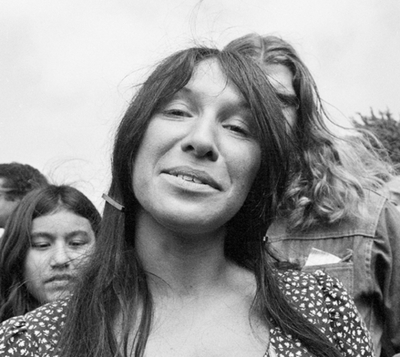In a Democracy Now! special, an hour of conversation and music with Cree Indian singer-songwriter Buffy Sainte-Marie
In the turbulent 1960s, she was just out of college but already famous for her beautiful voice and moving lyrics in songs like “Universal Soldier” and “Now that the Buffalo’s Gone.” Over the years, Buffy Sainte-Marie has worked with the American Indian Movement, but also with Sesame Street, and even Hollywood, winning an Academy Award for the song “Up Where We Belong” in 1982. She’s won international recognition for her music, has a PhD in fine arts, and began a foundation for American Indian Education that she remains closely involved with. We speak with the folk icon about her life, her music, censorship, and her singing and speaking out about the struggles of Native American peoples for the past four decades.
Guest: Buffy Sainte-Marie, Canadian First Nations singer-songwriter and activist. Her latest album, her eighteenth, is called Running for the Drum.
AMY GOODMAN: Today, a Democracy Now! special for Columbus Day, we spend the hour with the Cree Indian singer-songwriter Buffy Sainte-Marie. But first we go back with her to 1965. Buffy Sainte-Marie was on Pete Seeger’s show Rainbow Quest.
BUFFY SAINTE-MARIE: I think that most Americans feel that the Indians lost because of fair fights and superior odds and superior weaponry. That’s because that’s the only side of the story that’s been told. I’ll sing you a song that tells a little of the other side.
[singing] Now that your big eyes have finally opened
Now that you’re wondering how must they feel
Meaning them that you’ve chased across America’s movie screens
Now that you’re wondering, how can it be real
That the ones you’ve called colorful, noble and proud
In your school propaganda
They starve in their splendor?
You’ve asked for my comment I simply will render
My country ‘tis of thy people you’re dying.
Now that the longhouses breed superstition
You force us to send our toddlers away
To your schools where they’re taught to despise their traditions.
Forbid them their languages, then further say
That American history really began
When Columbus set sail out of Europe, and stress
That the nation of leeches that conquered this land
Are the biggest and bravest and boldest and best.
And yet where in your history books is the tale
Of the genocide basic to this country’s birth,
Of the preachers who lied, how the Bill of Rights failed,
How a nation of patriots returned to their earth?
And where will it tell of the Liberty Bell
As it rang with a thud
Over Kinzua mud
And of brave Uncle Sam in Alaska this year?
AMY GOODMAN: “My Country ’Tis of Thy People You’re Dying,” a 1965 performance by Canadian First Nations singer-songwriter Buffy Sainte-Marie. She was among the earliest if not the first celebrity to challenge the idea that, quote, “American history really began when Columbus set sail out of Europe.” We’ll hear more about this song later in this special broadcast, this hour of conversation and music with Buffy Sainte-Marie.
Today is supposed to commemorate the arrival of Christopher Columbus to the so-called “new world” in 1492. But the holiday has long caused anger among Native Americans who object to the official celebration of a man who opened the door to European colonization and the exploitation of native peoples in North America. Observance of this holiday is far from uniform across the country. South Dakota marks the occasion as “Native American Day.” Meanwhile in Denver, Colorado’s annual Columbus Day parade is met by protesters decrying the genocide of indigenous peoples.
Well, the award-winning folk icon Buffy Sainte-Marie has been writing and singing out about the struggles of Native American and First Nations people for well over four decades. In the turbulent ’60s, she was just out of college but already famous for her beautiful voice and moving lyrics and songs like “Universal Soldier,” “Now that the Buffalo’s Gone,” and “Until It’s Time for You to Go.” She was Billboard’s Best New Artist following the release of her first record.
Appearing on several television talk shows in the early part of the decade, this is how she explained her focus on Native issues.
BUFFY SAINTE-MARIE: Since I put all my time into Indian rights, and I think this is something I know something about and I think that my time is best spent, insofar as my political views are concerned. And it’s still pretty hard for a Canadian Indian to work the winter through, you know? There’s an awful lot of relief. There’s an awful lot of poverty.
What I’m trying to do is to use each time that I appear on television or on the radio or in a concert to use just a little of that time to inform the non-Indian population.
They say, “What Indians? They’re all in Hollywood. They all have oil wells.”
I think that the non-Indian people must understand why the Indians are in the state of affairs that they’re in. It’s not because they’re lazy, ignorant, inferior, stupid or anything. Chances are that if an Indian kid makes it these days, it happens because of some lucky accident.

